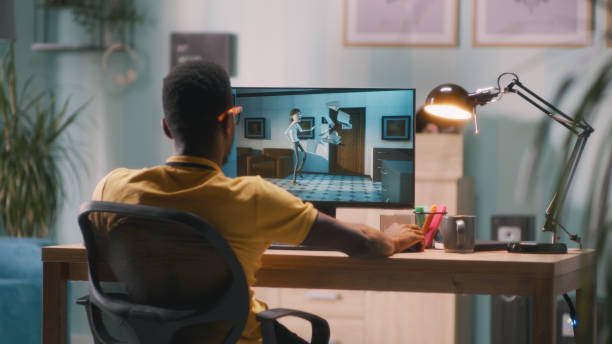Behind the success of most of today’s blockbusters are various professionals, including digital compositors. These professionals also have an essential role in digital media, including TV shows, movies, and video games.
If you have a decent background in visual technology or art, a career as a digital compositor might be ideal for you. This article will explore what a digital compositor is and cover every aspect of this profession.
Job Description
Who is a Digital Compositor?
The job of these professionals is to create seamlessness in and between shots.
Compositing is the last step of the VFX pipeline, so those compositors must combine 2D and 3D elements that make a shot and ensure they appear as if they belong in the same space.
For example, these experts may gain a foreground element shot in front of a green screen which they must integrate with a matte-painted background, FX elements, and CG characters.
These professionals are also sometimes responsible for smoothing out actors’ appearance to make them look younger (de-aging) and adding 2D effects like dust particles, motion blur, lens flare, and graphics.

Duties and Responsibilities
- Integrate a shot’s 2D and 3D elements while balancing each component’s technical and creative side.
- Stitch plates (live-action footage) together.
- Paint fixes, chroma keying, rotoscoping, color, grading continuity, and degrading/graining images.
- Work with green/blue screen effects, and create mattes.
- Enhance lighting effects and create convincing shadows within shots.
- Integrate rear projection into background images.
Where Can Digital Compositors Work?
Most of their jobs take place on a laptop or computer, and digital compositors usually work in studio or office settings, which allows them to work on the technical and design aspects of the design project.
These professionals can travel for work to look for locations that a director wants to include in a project or to help shoot scenes at a filming location.
When working as a digital compositor, you may work with other professionals, such as editors, artists, and other creative team members.
These professionals typically work full-time with instances of overtime work. The reason is that they typically have to adhere to strict deadlines, often requiring working overtime to fulfill them.
Education Requirements

As part of the multimedia artist group, digital compositors need a bachelor’s degree to enter the job market. There are exceptions, especially with highly talented people, but they must prepare for 4-year undergraduate learning.
During this time, you will learn everything from animation fundamentals to specific skills that all digital compositors need to succeed.
Once you have graduated, you’ll qualify to work for various lucrative industries, including film and video, gaming software development, graphic design, advertising, and animation.
Because of the nature of the work of digital compositors, everything they do will relate to digital artistry. They constantly have to handle multimedia software. So a Bachelor’s in Animation is one of the best degrees they can opt for.
Pursuing animation will enable them to gain the vast majority of the needed skills for their field, such as 2- and 3-dimensional projects, color key insertions, backgrounding painting, frame motion, and more. They can get a few alternative degrees, but these would not cover everything they must learn.
Essential Skills
As the career of digital compositors can require advanced work on many complex projects, they typically need a robust set of specialized skills to succeed in their field.
Top transferable skills
- Research.
- Creativity.
- Organization.
- Collaboration.
- Communication.
- Problem-solving.
- Attention to detail.
Top technical skills
- MAYA.
- JavaScript.
- Prototyping.
- 3D modeling.
- UX wireframes.
- Adobe Creative Suite.
- User interface (UI) design.
If you relate to the transferrable skills listed above, chances are you are already naturally inclined to be a digital compositor.
Do not be intimidated by the technical skills above. Many of them are covered in the curriculum of an Animation degree program.
Essential Tools
These are digital compositors’ tools.
- Image editing software: Adobe Photoshop.
- Digital painting and compositing software: After Effects, 3ds Max, Arnold, Blackmagic Fusion, V-Ray, Houdini, Maya, Mental Ray, and RenderMan.
Job Outlook

According to the U.S BLS, the demand for animators and multimedia artists is expected to grow around four percent, which is as fast as the average for all professions, from 2029 to 2029.
The fact is that the film industry has the highest concentration of employment for visual effects artists, including digital compositors.
The creation of computer-generated animation in design and scientific research was also expected to add more opportunities for these professionals.
Salary
The average annual salary for a digital compositor in the US is $61,350. By a simple salary calculator, it is the equivalent of approximately $29.50 per hour, $1,179 per week, or $5,112 per month.
The average annual salary of a digital compositor mainly ranges from $39,000 to $75,000, with top earners making about $101,500 annually across the US.
The average salary range for a significantly different digital compositor varies greatly (by $36,000). So, there may be many opportunities for increased pay and advancement based on location, years of experience, skill level, and more.
Advantages and Disadvantages
There are many pros and cons of being a digital compositor, including:
Pros
- Basic affordability.
- Reduced waste.
- Enhanced efficiency.
- Industry alignment.
- Increased career options.
Cons
- Technical difficulties.
- Replicable work.
- Abstract products.
- Decreased creativity.
- Long working hours.
FAQs
Who Do Compositors Work With?
- Prep artist: They create clean plates for compositors.
- Roto artist: These professionals work closely with compositors because the mattes they produce are necessary layers for compositors to work with. Roto artists work towards being promoted to a compositor position.
- Lighting technical director (TD): There are several overlaps in the responsibilities of lighting technical directors and digital compositors. Lighting technical directors must understand how compositors use different passes to supply them with “background plates.”
How can I be a Digital Compositor?
Here are some steps you can follow to start your career as a digital compositor:
Step 1: Complete Education.
Most employers require applicants to complete their high school degree. While many finish their General Certificate of Secondary Education (GCSE) at 16, you can also sit for the GCSE exam later in life as an independent candidate.
Step 2: Develop and hone your skills.
While working on the educational portion of your career path, developing your skills is wise. We recommend looking for extra learning opportunities like in-person or online courses to help build your skills if this is available to you.
Step 3: Consider getting a university degree.
Attending college can give you an edge when applying for a digital compositor job. Consider joining a university program focusing on VFX, media, animation, and other tools and skills you may need for your career.
Step 4: Complete an internship.
An internship can be a great way to get experience as a digital compositor while at university. You might consider your institution’s career services and internship departments to connect you with an internship role.
You can also try to find an experienced mentor to help you navigate your career and connect with other pros who can help you find and get an intern role.
Besides helping you get the skills needed to succeed, an internship can be an excellent CV builder when applying for full-time, permanent roles.
Step 5: Pick a specialization.
You can consider specializing when developing your skills and completing your education. Demonstrating advanced skills in an area of focus can help you stand out when applying for roles in the area.
Step 6: Search for freelance work.
Working as a freelancer can also be a great way to build experience when becoming a digital compositor.
You can work in various styles and for different kinds of media on a freelance basis. It will help you identify a niche that interests you and will enable you to hone your artistic and technical skills.
Moreover, freelancing can help you build a great CV when you pursue a full-time, permanent role later.
Step 7: Explore open roles.
Now is the time to research open roles for digital compositors in your specific area of interest and other specialties.
Pay attention to the requirements in the job listings and consider pursuing additional certifications needed.
It is okay to keep track of the information you find with a spreadsheet and list application if it is helpful for you.
Step 8: Prepare and apply for a job as a digital compositor.
The final step involves developing a cover letter and CV showcasing your abilities as a digital compositor. Try to fine-tune your materials for each role you want to apply for.
Some organizations use ATS software or applicant tracking systems, which can scan application materials for keywords and sort ones that cover them for the recruiter to view. So you can use this to include keywords from each job listing in your cover letter and CV.
Furthermore, you can benefit from researching the company’s goals and mission and addressing how you can help them reach their objectives in your materials.
How Long Does It Take To Learn Compositing Programs?
The study pathway that prepares you for a career as a digital compositor usually lasts one year. It helps you develop the essential skill set and make impressive shots to show employers.
What Is a Compositor Good At?
- Working to deadlines: It refers to working within given time frames and being able to complete your work under pressure.
- Collaboration: Be able to collaborate with other artists and use each other’s resources efficiently and effectively.
- Knowledge of compositing programs: It involves being adept at using relevant programs such as Blackmagic Fusion, After Effects, Maya, Houdini, Photoshop, and Nuke.
- Knowledge of photography: These professionals must understand cinematography, cameras, and how films are created.
- A good eye: Know what makes an image appear realistic in terms of color, light, perspective, and composition.
Are Digital Compositors In Demand?
Digital compositors have a bright future and filmmakers are in constant search of talents in the field.
Career Advice
Today, digital compositors are in high demand and continue to be since the world has become increasingly digitized. Most television shows and movies nowadays need the help of these professionals.
Moreover, they are required outside the entertainment industry, in various commercial companies, in advertisements, and more.
So there is no denying that digital compositors have a bright future with many career opportunities that allow them to receive high salaries.
Digital compositors are not always required to have a degree, but it is typical for them to hold a bachelor’s degree in animation or visual effects.
